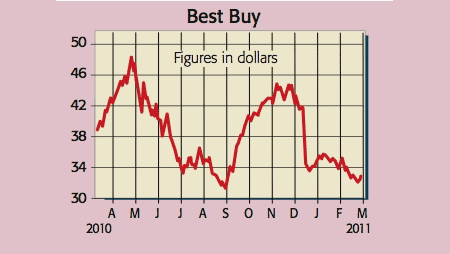
I’m not a big fan of non-food retail owing to my concerns over consumer spending and tax increases. However, there are always exceptions – especially where I feel that a share has been oversold.
Take Best Buy, the world’s largest vendor of consumer electronics. Its turnover of $50bn comes from operations spanning North America, Europe, Mexico and China. It owns the coveted Geek Squad service, which sorts out technical issues for customers and it shares a 50:50 joint venture with Carphone Warehouse – making it Europe’s biggest independent cell-phone retailer.
So what has alarmed investors? Well, in December the firm released a profit warning. This was on the back of lower TV prices, slumping sales of gaming software and intense competition from rival discounters. Then in January news came that it was shutting its nine Best Buy superstores in China to focus instead on its local 5-Star chain. That announcement stoked fears about its ability to expand outside the United States.
But I am not too worried. These issues can be fixed by shifting the firm’s focus towards smaller hi-tech stores, where it can leverage its in-house expertise in gadgets that are tricky to use. Indeed, it has even teamed up with Apple to launch the new iPad2.
This is interesting, because it plays right into the hands of Best Buy’s new obsolescence-protection product. Its clever Super Bowl advertisement starring Ozzy Osbourne and Justin Bieber promises (for a fee) to repurchase any gadget at a pre-determined amount over the next two years. By introducing the iPad 2 just 11 months after the original’s debut, Best Buy should cash in on ever-shorter upgrade cycles.
Best Buy (NYSE: BBY), rated a BUY by RBC Capital Markets
Better still, the board seems to have learnt from its experience in China. It made the mistake of failing to differentiate its merchandise, as well as building large flagship stores, rather than smaller, conveniently located outlets. China may have one of the highest car adoption rates in the world, but its perennial traffic congestion and lack of parking mean consumers often prefer to shop closer to home. A government ban on free bags has also resulted in more frequent trips to the shops in which customers buy less each time, further fuelling the popularity of neighbourhood stores.
By following a strategy of concentrating on its smaller 5-Star stores, Best Buy will showcase new technology, be smarter in product selection, and become more local in order to compete with savvy, domestic players.
In terms of the numbers, Wall Street is forecasting 2011 sales and underlying EPS of $50.3bn and $3.31 respectively, rising to £52.2bn and $3.60 in 2012. That puts the stock on forward p/e ratios of less than ten, while it also offers a 1.8% yield. I would value the company on an eight-times earnings before interest, tax and amortisation (EBITA) multiple. After adjusting for the net debt of $864m, that generates an intrinsic value of more than $41 per share.
That said, there are risks. These include intense competition from the likes of Wal-Mart, Amazon and eBay, an economic downturn, and foreign-exchange considerations for British investors. Fourth-quarter earnings are due out on 24 March and RBC Capital has a target price of $42 per share.
Recommendation: BUY at $31.40